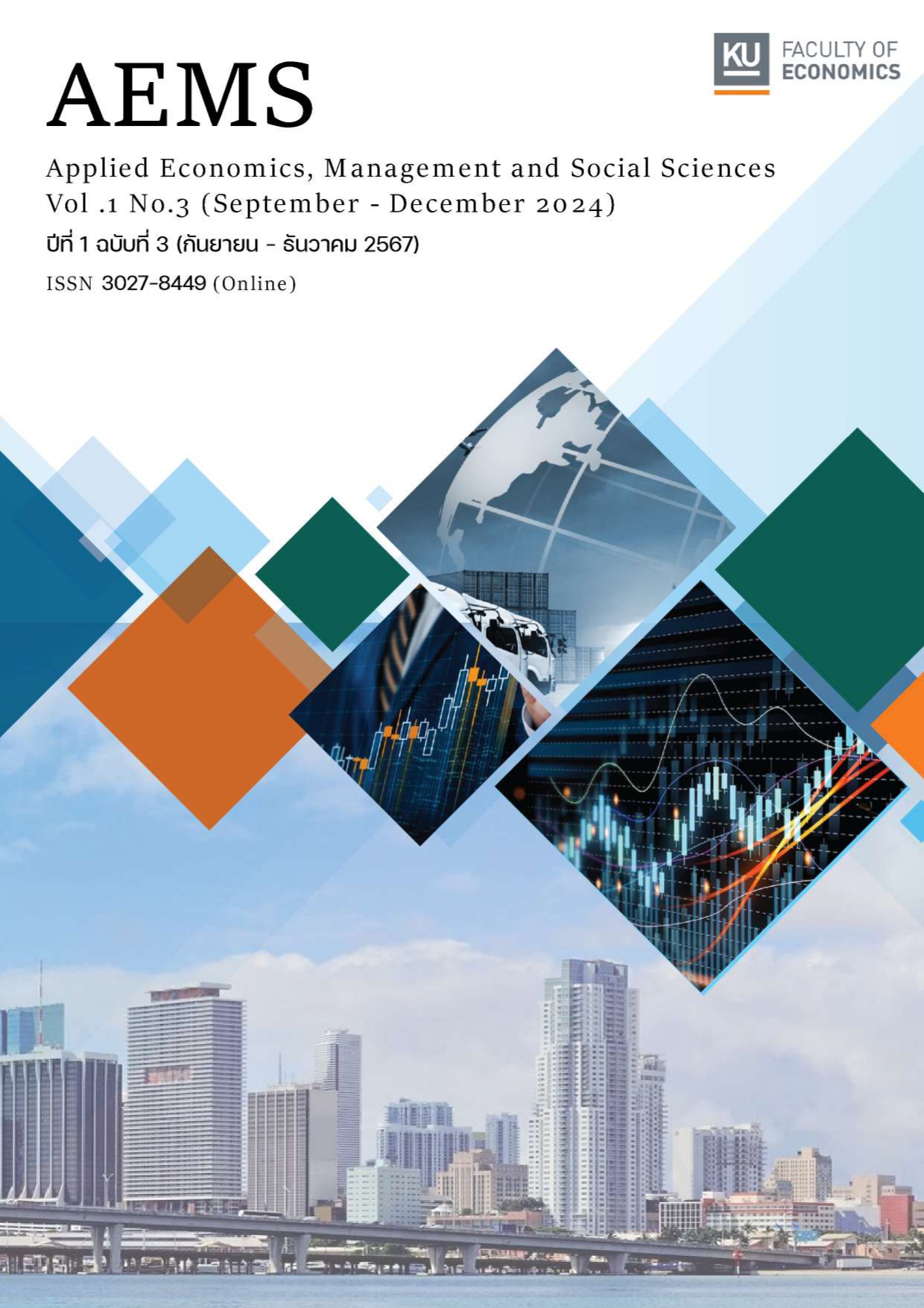การวิเคราะห์การเปลี่ยนแปลงจุดหมายปลายทางการท่องเที่ยวของไทย ด้วยวิธีการแยกองค์ประกอบของการเปลี่ยนแปลงรายได้การท่องเที่ยว
Main Article Content
บทคัดย่อ
บทความวิจัยนี้จึงมีวัตถุประสงค์ที่จะประเมินการเปลี่ยนแปลงจุดหมายปลายทางการท่องเที่ยวจากจังหวัดท่องเที่ยวหลักไปยังจังหวัดท่องเที่ยวรองด้วยวิธีการแยกองค์ประกอบของการเปลี่ยนแปลงรายได้การท่องเที่ยว เพื่อระบุถึง แหล่งที่มาของการเปลี่ยนแปลงรายได้การท่องเที่ยวของไทยในช่วง ปี 2553 ถึงปี 2566 ผลจากการศึกษา สรุปได้ว่า การเปลี่ยนแปลงรายได้การท่องเที่ยวของไทยมีการเปลี่ยนแปลงไปในทิศทางเดียวกับการเปลี่ยนแปลงจำนวนผู้เยี่ยมเยือน เป็นส่วนสำคัญที่สุดที่มีผลต่อการเปลี่ยนแปลงรายได้การท่องเที่ยวไทย การเพิ่มขึ้นอย่างต่อเนื่องของค่าใช้จ่ายการท่องเที่ยวต่อครั้งเป็นส่วนสำคัญที่สนับสนุนให้รายได้การท่องเที่ยวเพิ่มขึ้นทุกปี ในส่วนของผลจากการเปลี่ยนแปลงพฤติกรรมการเลือกจุดหมายปลายทางไปยังจังหวัดท่องเที่ยวรองและปริมณฑลเกิดขึ้นไม่มาก มีข้อเสนอแนะเชิงนโยบาย ได้แก่ (1) การดำเนินมาตรการด้านการประชาสัมพันธ์จังหวัดท่องเที่ยวรองยังคงมีความจำเป็นและต้องมีการดำเนินการอย่างจริงจังและ (2) การเพิ่มศักยภาพและการยกระดับความพร้อมของจังหวัดท่องเที่ยวรอง และ (3) ควรสร้างแรงดึงดูดของจังหวัดท่องเที่ยวรองเพื่อดึงผู้เยี่ยมเยือน
Article Details
เอกสารอ้างอิง
Ampilasai, S., Pongyeela, A., & Khamsuprom, S. (2021). Factors influencing sustainable tourist villages in secondary provinces of Thailand. Academic Journal of Phetchaburi Rajabhat University, 11(2), 101-114.
Ang, B. W. (2004). Decomposition analysis for policymaking in energy: Which is the preferred method?. Energy Policy, 32(9), 1131-1139.
Ang, B. W., & Liu, F. L. (2001). A new energy decomposition method: perfect in decomposition and consistent in aggregation. Energy, 26(6), 537-548.
Chaivichayachat, B. (2019). The economics impacts of tourism sector in Thailand by tourism input-output table. Bangkok, Thailand: Department of Economics, Kasetsart University.
Chaivichayachat, B. (2020). An application of decomposition method for the changing in foreign tourism revenues in Thailand. Journal BEC of Naresuan University, 15(1), 8-19.
Chaivichayachat, B. (2021). Evaluation of tourism externalities of tourism community in second-tier tourism provinces. Bangkok, Thailand: National Research Council of Thailand.
Chaivichayachat, B. (2022). Thai Tourism Area Life Cycle. Bangkok, Thailand: Department of Economics, Kasetsart University.
Chaivichayachat, B. (2023). Tourism expansion and area-based balance. Business Review, 15(1), 111-126.
Chaivichayachat, B., Luksamee-Arunothai, M., & Taweevachirawat, P. (2021). Evaluation of tourism externalities in second-tier tourism provinces for sustainable development in tourism. Bangkok, Thailand: National Research Council of Thailand.
Chotisopanun, C. (2019). Potential of supply of tourism in secondary provinces in the link. Bangkok, Thailand: National Research Council of Thailand.
Chuankrekul, S. (2018). The enhancement of cultural tourism marketing strategy in less visited areas of Singburi Province. (Doctoral dissertation, Siam University).
Getz, D. (1986). Models in tourism planning: Towards integration of theory and practice. Tourism Management, 7(1), 21-32.
Jaisom, P., Toopgrajank, S., Charoenwiriyakul, C., Boonpadung, P., & Tipayatikumporn, U. (2020). Antecedents of sustainable of less visited area tourism. Journal of MCU Peace Studies, 8(1), 133-144.
Kanchula, C. (2020). Factors affecting the decision to travel to secondary cities of Thai tourists: A case study of Ang Thong Province. Journal of Sustainable Tourism Development, 2(2), 64-80.
Loima, K., & Kaewnuch, K. (2020). Guidelines for enhancing the perceived image of secondary city tourism in Thailand: A case study of Singburi Province. Sripatum Review of Humanities and Social Sciences, 20(2), 91–104.
Luksamee-Arunothai, M., Chaivichayachat, B., & Taweevachirawat, P. (2021). Evaluation of tourism externalities in second-tier tourism Provinces for sustainable development in tourism. Bangkok, Thailand: National Research Council of Thailand.
Orrungvilai, T. (2019). Decision-making process in local travel of Bangkokian. (Master's thesis, Ramkhamhaeng University).
Ratnaraton, C. (2019). Factors Affecting the Decision of Thai Tourists in Secondary Cities. (Master's thesis, Srinakharinwirot University).
Teerarat, S., & Pasunon, P. (2020). The analysis of second tier city’s readiness for decision making of MICE events in Thailand: Viewpoints of stakeholders in Central, Northeastern and Southern regions. Romphruek Journal Krirk University, 38(2), 21-33.
Tongkaw, A., Saethow, P., & Sahunan, S. (2020). Causal relationship model affecting tourist loyalty of a secondary city on the East coast. Dusit Thani College Journal, 14(3), 162-177.
Vichenpalis, S. (2021). The suggesting to promote tourism in secondary provinces for distribution of tourism revenues. Bangkok, Thailand: Parliamentary Budget Office.

